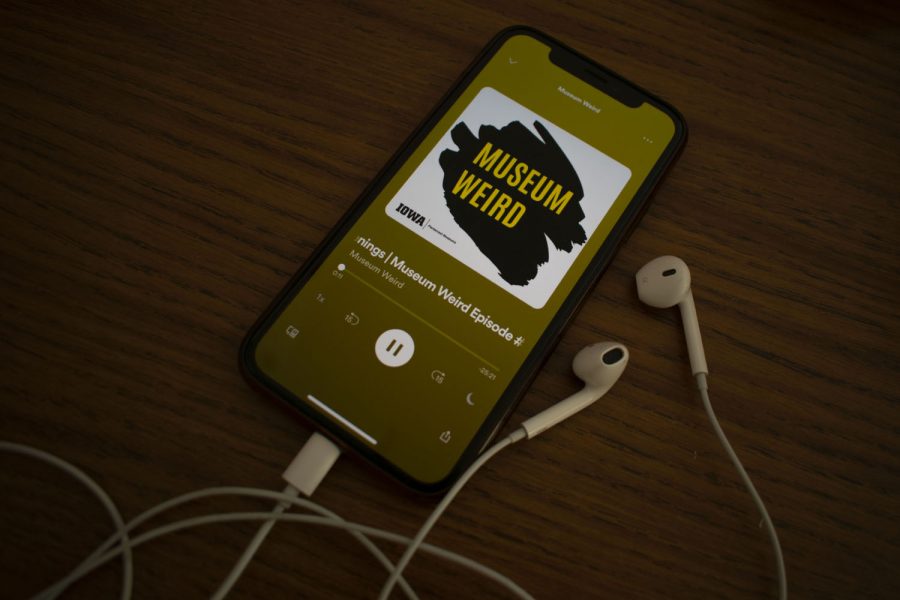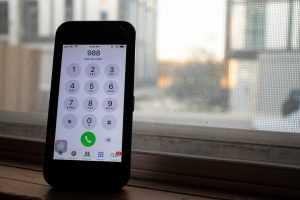University of Iowa Pentacrest Museums shift to virtual tours, podcast to expand reach
Since closing their doors to the public in March, the museums are focusing on keeping their audience engaged virtually during the COVID-19 pandemic.
Photo Illustration by Raquele Decker
November 3, 2020
When University of Iowa senior Seth Moffitt looked for a place to study his freshman year at the university, he said he was always drawn to the university’s museums.
From doing homework to studying for exams, Moffitt said he found a home at the UI’s Pentacrest Museums, where he now works as a Docent Manager.
Now that the museums are closed to the public unless visitors have a reservation, Moffitt is helping the UI Pentacrest Museums find new ways to interact with the public.
“Before I worked here, all of my time in between classes was spent in a museum,” he said. “I want to work in a museum for the rest of my life … but, obviously, COVID-19 has changed how museums work.”
The UI Pentacrest Museums closed their doors to the public in March following the outbreak of coronavirus in Iowa. Since then, the UI Pentacrest Museum’s Communications Coordinator Jessica Smith said the museums have focused on how to ensure museum-going is safe.
“We’ve had to adapt really quickly to meet the needs of our students, campus, and community during these times,” she said. “We’ve tried to focus on bringing virtual and digital content to the public through educational programming and converting some exhibits into virtual exhibits so people can access them from home.”
Smith said the pandemic has forced museums to get creative when it comes to keeping communities engaged. She said the museums have learned from museums around the world to alternatives to in-person visits and have adapted to working on a case-by-case basis with virtual visits for UI classes and researchers.
RELATED: Drive-in-art presentation set at UI Stanley Museum of Art
Alongside embracing social media and virtual tours of current and special collections, the UI’s Pentacrest Museums also look toward unconventional experiences for museum goers by creating their own podcast.
Moffitt and UI senior Lea Peterson, who is a docent manager at the UI Pentacrest Museums, are hosting the UI Pentacrest Museum’s conversational podcast, entitled “Museum Weird.”
The podcast launched in October and will come out monthly, Peterson said. She added that she hopes the podcast will get students on campus involved with the museums.
“We wanted to focus on student engagements because a lot of people look at [the] Old Capitol and don’t realize it’s a museum,” she said. “My freshman year, I didn’t even know. We just played with the idea of a podcast because it’s something we can do remotely and keep our audience engaged with, even if we aren’t on campus.”
The podcast is designed for people who wouldn’t go to museums as well as those who love them, Peterson said. She added that the podcast’s topics are digestible and engaging for the 20-minute, monthly episodes.
She said the podcast is about developing a community while museums are closed to the majority of the public for the foreseeable future, as well as a way to reach out to other museums and see what they’re doing in response to COVID-19.
Moffitt said the podcast will touch on parts of museums that the general public doesn’t know about. The informational podcast will talk about how the public perceives museums, which is something Moffitt said he’s excited to dive into.
Both Moffitt and Peterson said they hope to gain listeners who would not typically go to museums.
“I would love to see our audience grow outside of the university community,” Moffit said. “Obviously, this podcast is for campus, but I would love to start seeing a wider array of people who are impacted by the podcast.”
As the museums prepare to safely reopen to the public eventually, Peterson said she is excited by all of the opportunities the Pentacrest Museums have to offer people virtually.
“We love our museums,” she said. “And of course, we want to welcome people back in and it’s hard to say no to people who want to come in. But our first priority is keeping people safe. We’re still going to be around, and when we do open to more of the public again, we will still have the online aspects for people who don’t feel comfortable coming in person. Everyone is invited to our museums and the information we have to share.”






